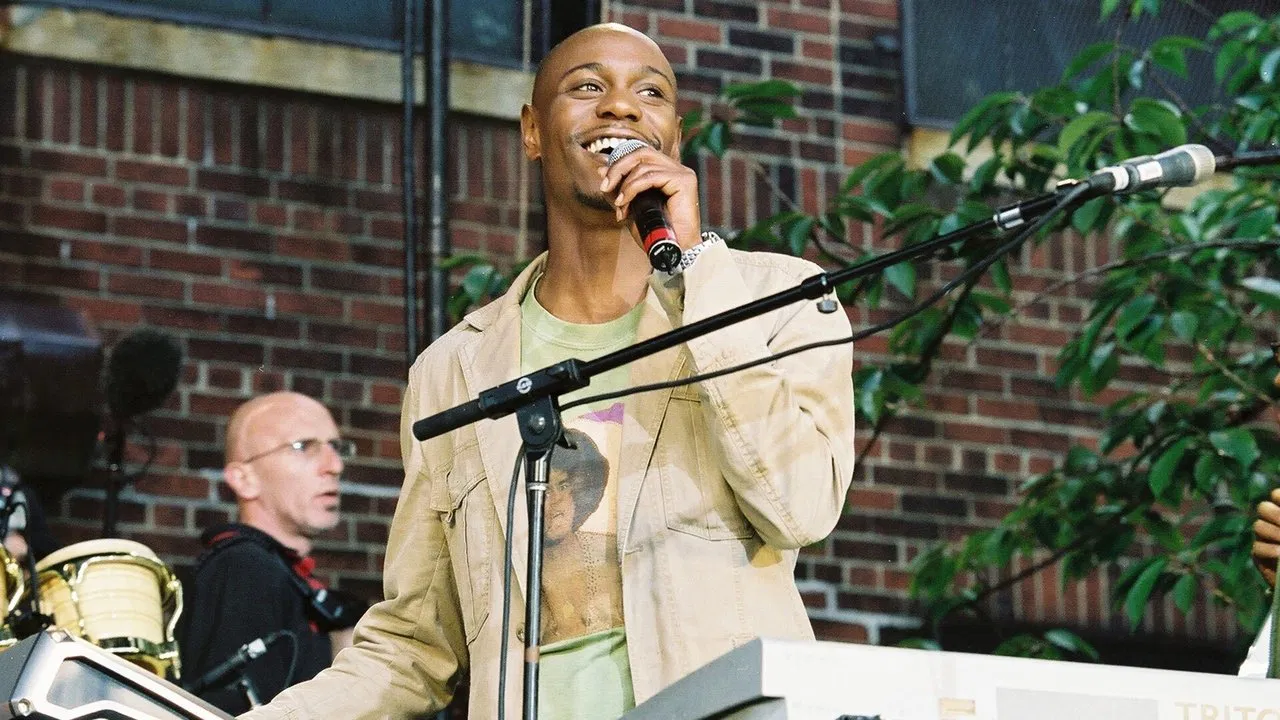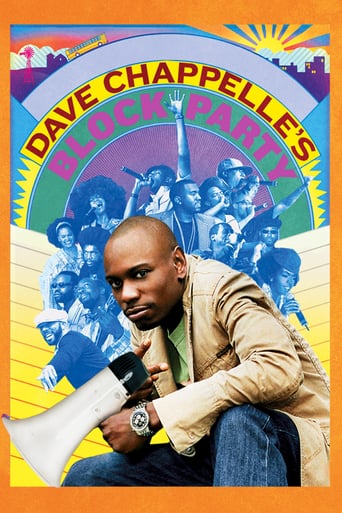

"Dave Chappelle's Block Party" watches as stand-up comedian Dave Chappelle attempts to put together a secret, low-budget block party in the Bedford-Stuyvesant district of Brooklyn, New York. The film was inspired by Mel Stuart's "Wattstax". Though directed by Michel Gondry, Chappelle was the creative force behind the picture.Chappelle grew up in a middle class, Washington DC household. His sketch show, "The Chappelle Show", became popular in the early 2000s. After three seasons Chappelle would cancel the show, disgusted with the commodification of both his image and message. His "Block Party", in many ways, plays like a summation of this period of his career. A work of social critique, the film finds Chappelle attempting to put on an entirely self-funded block party which exists outside of the sway of big corporations. Bypassing the need for corporate sponsors and relying heavily on the charity of artists, the film attempts to put on a carnival reminiscent of the more spontaneous ghetto parties of yesteryear."I could no longer be sure of the authenticity of the show," Chappelle says of his TV work. "Block Party" is itself obsessed with "authenticity". In this regard, Chappelle attempts to put on a show which resists artificiality, commodification, flies under the radars of the media circus, is free from restrictions and corporate obligations and exists entirely outside of capitalist logic. He then assembles a number of social critics and singers, some of whom don't receive mainstream media exposure due to their challenging perspectives. So we have the pseudo-Marxian hip-hop group Dead Prez ("capitalism is born from the backs of blacks"), the socially conscious Mos Def ("War is a global, economic phenomenon"), the didactic Talib Kweli and artists like Erykah Badu and Wycleff Jean. This, Chappelle tells is, is "the show he always wanted to attend". One which not only educates and entertains, but which serves as a means of creatively transforming oppressive environments and which ushers people toward social emancipation.Unlike most music festivals, Chappelle's rave is set deep within a bustling, impoverished neighbourhood. His audience is chiefly comprised of African and Latin-Americans, some of whom are provided with free transport to the venue. Elsewhere the film contains brief interviews: we meet a white couple who build a home on their own, various school teachers, artists and urbanites. Complaints about the "bad language" present in R and B are juxtaposed with the slang of black New Yorkers, to whom the N word is either blasé or a term of endearment. Chappelle, foul mouthed, is himself a devout Muslim. This is unsurprising. Today, most of the moral challenges hurled at capitalism come from select minorities or those on the system's fringes (the Catholic church is tentatively trying to build a new identity doing the same). As time goes on, they all become absorbed by existing power structures.Of course you can bring a horse to water, but you can't force it to drink. Though Chappelle means well, his little resistance meets unforeseen obstacles. Gondry's cut of the film is shapeless, omits key songs and keeps deviating from the party line (influnced by Chappelle, Gondry would direct documentaries on Noam Chomsky several years later). Singers like Kanye West also offer little, whilst other songs veer toward misogyny, a trend common in rap and hip hop, a genre which subconsciously tends to revolve around castration and expressions of powerlessness. Ironically, all the "strong", "empowered", "successful" African-American female singers (Erykah Badu, Jill Scott, Lauren Hill) present in the film sing love songs in which they fawn over men. The result is a mixed bag, a result which is perhaps inevitable. As Herbet Marcuse once wrote: "As the music of the soul is now the music of salesmanship, all alien/black rationality is centred on the rationality of the status quo." Or as philosopher Theodor Adorno once said: "what slips through the net is always filtered through the net."7.9/10 – Worth one viewing.
... View MoreI was thrilled to learn that Gondry put out a book with Picturebox Inc., called, "You'll Like This Film Because You're In It: The Be Kind Rewind Protocol." The book talks about the experience of filming Block Party, how weird it was for him as a French man from Versailles filming some for Dave Chappelle and his friends. Gondry then goes onto to describe his project to create a film Utopia: different communities film themselves and then play it in theaters.Amidst his French jokes, "my ego was eaten up with every sauce", Gondry's goal is to "prove that people can enjoy their time without being part of the commercial system and serving it...Ultimately I am hoping to create a network of creativity and communication that is guaranteed to be free and independent from any commercial institution." This book is intended for admirers and independent filmmakers and can even be used as an educational tool.It's great, Gondry's anecdotes are great he is a special weird man. Highly recommended.
... View MoreI remember when Dave Chappelle played Ahchoo in "Robin Hood Men in Tights", I remember seeing Dave Chappelle live on New Year's Eve '97 in Oakland, Ca., I remember Dave Chappelle playing the obnoxious comedian in "The Nutty Professor". My my how Comedy Central helped propel Dave to stardom.The Block Party was funny and entertaining. I like what Dave Chappelle did for the people of Brooklyn, because how else would they be able to see such an event without spending a week's pay on tickets. I'm even more impressed with Dave Chappelle's musical artist selection. There were some very positive and articulate artists performing. That was very inspirational to see. What seemed like it was going to be just a meaningless comedy actually turned out to be a very positive and meaningful documentary.
... View MoreDave Chapelle is a good comedian.He tried, seriously, to make a good film and he almost got the job done. He got the kids from the Ohio college drum corps on the bus into New York.These kids are absolutely beautiful. He got the bands. He got the freaky site for the concert, complete with leftover hippies living in Nowheresville,New York City. The problem with this movie is that the rappers are passe. Rap music is just over. I'm sorry- it just doesn't get the job done. Rap is a genre that is failed. Moving along. Lauryn Hill absolutely stops the show, with the Fugees, in her rendition of "Killing me softly with his song". There is titanic wonder in her voice. Lauryn Hill is abso-positively wonderful in her singing. Rent this movie just to hear her sing.
... View More